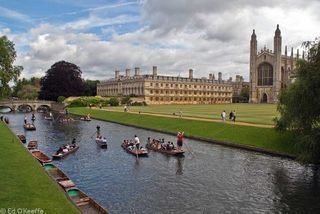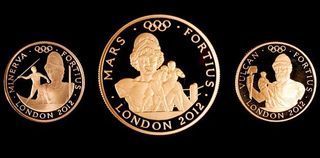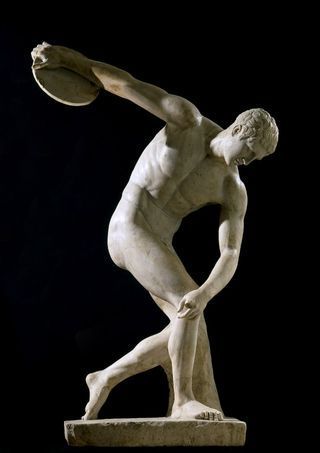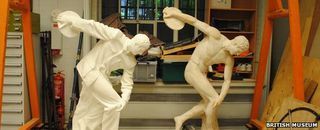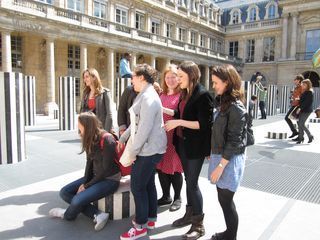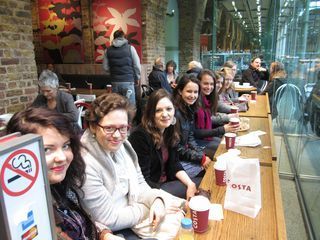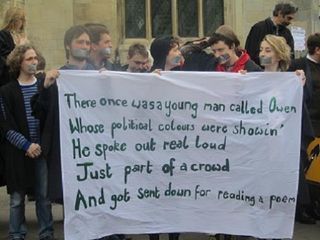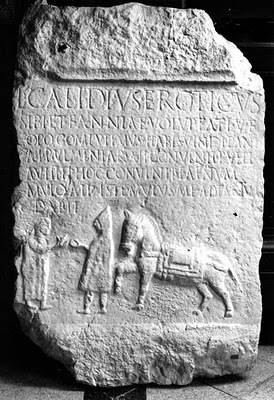Mary Beard's Blog, page 55
June 2, 2012
How are you spending the Jubilee weekend?
Here in Cambridge, exams rule... and, as usual, we are paying not a blind bit of notice to the season's festivities. We never observe the early summer bank holidays here. That is to say, university life goes on as it ever did, the libraries are open and the students sit the Tripos (and we mark it), jubilee or not.
My own priority for the next couple of days is to get a version of my big lecture in Paris done, to send off to the translator (the deadline was today, but I'm hoping that Monday won't matter too much). The students are heads down in their exams (but I havent got any scripts to mark yet) . . . remember please when they have a few nights of over the top celebration afterwards, that they missed this weekend's jollities.
The topic in Paris is "Les Romains riaient-t-ils", and I have got more than enough to say .. except I don't know what bits to focus on, for an hour's talk in French -- which always takes longer than in English (in my French, at least -- if I was more fluent, no doubt I'd romp through). So that's what the weekend is for. I'm hoping that a punchy version will be done by Monday, whatever else is happening.
Meanwhile, I have been going on with the French lessons, and especially with 'le francais familier' (definitely not to be used in the big lecture though,or so I'm told -- but great to discover all those words that were kept from us at school). I'm working once a week with the Newnham lectrice, both on chat and comprehension of tv videos. We looked at "Dr Cac" today, obviously a new French phenomène) and got together more and more vocabulary I didn't know (bosser = travailler; une baston = une bagarre . . . no wonder I didnt understand French tv before I did this).
And I did some French tongue twisters, for pronunciation purposes... Un chasseur sachant chasser doit savoir chasser sans son chien.. etc etc
It is of course quite hard to keep going on through all the flag waving. And when you're a bit out of it, it's also kind of hard to take the euphemistic eulogies of her Majesty quite seriously. When David Cameron says she "has never put a foot wrong", does he really expect us to think that is true? Sixty years and NEVER a foot wrong... ?? Don't patronise us (or her); get real.
Much more to the point is that she has put plenty of feet wrong, as has her husband, but on balance, for the time being, we'd prefer her to the alternatives. My problem, of course, is not Her Maj herself, but the whole pyramid of privilege she legitimates -- not to mention the young royals and the money they plough into Bouji's and Tatlerland.
Signed: a hard-working, semi-monarchist Republican, who wont be seeing much of the celebrations (or minding too much., but hoping those that are taking the time off have a good time).
May 28, 2012
Exams
The Easter (that is the 'summer') Term in Cambridge isn't much fun honestly. All the students think about is the upcoming exams. This means that you get pretty full houses to your lectures, but instead of engaging and arguing and answering back, they are hanging on your every word hoping to commit it to memory, to be regurgitated soon.
For me, this is a downer.. and it's especially a downer if you are examining a paper you are lecturing for. There is not much that is more intellectually humiliating than reading 75 scripts, where each candidate has fed you back a more or less well remembered version of a lecture you gave a month ago (to put it another way, it shows you how unclear your lectures must be).
As for supervisions (that's our small group teaching), they move from the argumentative and productive exchange of views of MIchaelmas and Lent, into something more like a counselling session. I can't count the times I have said this term... the key is to ANSWER THE QUESTION and to ARGUE (don't just 'write all you know about . . . "); if the question looks simple, it almost certainly isnt .. so think why not; go beyond the lectures and dont just regurgitate them; more marks are lost by being too tired or not answering the question or going to the wrong exam room than by ignorance....
So why do sudden death exams? Wouldn't some form of continuous assesment be fairer and better and more educationally productive?
I'm not sure. In our final year, we do have a dissertation option (10,000 essay on a subject of your choice, cashing in for one of four papers) which many of our students now do. It's good, but I'm not sure I want more of it. The advantage of a sudden death exam is that it is SUDDEN. And it frees up the other two terms for experiment and for risk taking and for not always worrying that everything you do will somehow "count" towards your final degree. The best bit of teaching is when kids chance their arm in writing an essay, and they would be much less likely to do that if the spectre of assessment was always hanging over their heads.
And anyway Cambridge students cant say that exams are inherently unfair to THEM... after all they had to be good at doing exams (as well as being smart in a myriad other ways), just to get here.
Meanwhile I am off to Warwick tomorrow to talk about the study of ancient inscriptions in the nineteenth century. And to celebrate the season I am going armed with some "Inscription" exams of the 1880s.
Now these are really weird. 15 questions on the paper, and it says 'You are advised not to attempt more than 7 questions". Now what exactly did that mean.. that you should do 7, that 6 done well was a better bet....? We shall puzzle it out tomorrow.
But presumably they all understood back then.
And presumably our own exam jargon is just as coded. In 100 years there will be people wondering what "Irrelevance will be penalised" meant plastered over the front of our exam papers.... or "candidates are advisd of the importance of writing legibly" (or whatever the slogan exactly is).
May 24, 2012
Dirty linen in public?... Moses Finley and the archives
I have lived in Cambridge for more than 30 years, and generally I think it is extremely nice to stay in the same place for so long. I guess my Mum and Dad felt the same about Shropshire, which I left too long ago really to recall.
In Cambridge, I like going to the University Library and talking to the same people on the entrance desk, when I come to borrow my books, as I did years and years ago..we've all grown older together and have grown up with a similar set of self ironies about stamping books, and libraryfines and whatever. (Let it be said to all those in charge that I have a glow of pleasure when I walk in to the UL, and have a human encounter before plunging into the stacks..no more computerisation at the entrance desk please, and if we could have the Georges back, that would be great. Much nicer than the worthy modern stuff we now have.
And I like the conversations you still have across the generations. Our house was once the house of A N L Munby (he soon moved on to better and posher premises) and I smile when I go to the Rare Books Reading Room in the UL, which is named after him. And after a few decades of working on the later nineteenth century, I can walk around town and say.. "J E Sandys used to live there" vel sim.
It all sort of joins up.
So far, so nostalgic... and comfortable. But a few days looking at the bits of Moses Finley's papers in the UL have given another side.
OK there's some of the reassuring, "well I never", to be found in the 20 or so boxes of half sorted Finley papers. I had a little jump when I found out that the place that Finley had rented when he first came to Cambridge is 1954 was 15 Oxford Road (above), about two minutes round the corner from my place (now as the picture suggests) quite posh.
But for me it wasn't quite all so cosy. I'm looking at the Moses Finley papers for a paper I'm doing on Finley's centenary. And I think that it's been the first time I've ever gone through the archives of someone I actually knew (Jane Harrison wasn't all that remote, but I actually sat down at dinner with Finley -- Harrison was dead almost 50 years before I first showed up in Cambridge).
I've talked before, I think, about feeling slightly uneasy about reading other peoples' private letters, not meant for your eyes. It was even weirder finding cards and letters in this archive whose writing I already recognised.. because I'd received them myself.
There was Hugh Plommer's comments on Finley's manuscripts. He had used to take me out on weekend trips to Northants churches when I was an undergraduate in a way that would not pass the harrassment police now (actually one of the most brilliant teaching experiences I ever had).
And then I spotted in one file the distinctive handwriting of (the longish dead) Simon Pembroke (one of the smartest and least productive students of Greek religion ever). I knew it was Simon because I still have a card from him on my study mantelpiece. It was written soon after the division into first and second class post came in.. "SECOND CLASS ONLY" it reads, "FIRST CLASS TOO GOOD FOR BEARD". And there he was writing quite deferentially to Finley.
I found some amazing stuff (more later), but I had a very strong sense that I shouldnt actually be rummaging through it all.
May 21, 2012
How Roman are the Olympics?
I've been suffering from a nasty case of pedantry. The Olympic Games may be one of the institutions given to the world by the ancient Greeks, but almost everywhere you look they are being dressed up in decidedly Roman colours.
Henry Porter had an article urging the return of the Elgin Marbles in yesterday's Observer (not a hugely well informed one, it must be said). It started with the Olympics and the Vestal Virgins who were supposedly in charge of the Olympic flame. Sorry, not only is the flame thing in its current form a 20th century invention, but the Vestals were Roman -- guarding the sacred flame in the Roman forum. And Vesta is a Roman goddess, Hestia is the Greek equivalent.
And then there are the commemorative gold coins (designs above) decorated by the Royal Mint with Roman gods (Vulcan, Mars, Juno etc) down to the last damn sovereign.
It's given us classicists (me included, I confess) hours of pleasure, tut tutting about each new apparent error.
But maybe we shouldn't be quite so quick to carp.
For a start there's nothing new about this. We've mostly forgotten the furore at the Sydney 2000 Olympics, when it was discovered that the medal design featureed the Colosseum not a Greek temple. But there was plenty of Greek indignation and Australian bluster then (it's not THE Colosseum they said, but a generic one... which hardly made it better).
But more to the point, overall the ancient Olympics were "Roman" almost as long as they were "Greek" (second century BC to the end of the fourth century AD), and the chances are -- as so often -- that the Romans institutionalised and canonised what we think of as "Greek". The truth is that an awful lot of "Greek" antiquities are actually "Roman Greek". Take Eleusis, for example, a hoary old Greek sanctuary to be sure, but most of what you see there was actually built by the Romans (partly because they had a lot of cash to throw around).
It must have been with all this somewhere in the back of my mind that I decided a few months ago that I would give my talk at the Roman Society's AGM in June on "The Roman Olympics". But I've got rather more work to do on the subject yet....to make it stick.
May 18, 2012
The Discobolus gets dressed up
Just as that wonderful symbol of Nazi power -- aka the Olympic flame -- arrives on these shore, the British Museum is announcing that it will be putting its "Discobolus" or "Discus Thrower" back on show (it's been travelling around foreign exhibitions for a few years).
This Discobolus is one of quite a few Roman copies of an original fifth-century bronze by Myron -- and it was part of the collection of Charles Townley, which went into the Museum in the early nineteenth century. He'd bought it in Rome, straight from being dug up at Hadrian's Villa at Tivoli (or so he was told).
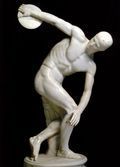 The truth is that it is a bit of a patched up job. Even Townley was a bit worried about the head. He was assured that it had been found right next to the body -- but no discus thrower ever looked at their feet like that. The "Lancellotti Discobolus" (Hitler's favourite version.. just to continue the Nazi theme) is what you'd expect (left).
The truth is that it is a bit of a patched up job. Even Townley was a bit worried about the head. He was assured that it had been found right next to the body -- but no discus thrower ever looked at their feet like that. The "Lancellotti Discobolus" (Hitler's favourite version.. just to continue the Nazi theme) is what you'd expect (left).
But the mis-restored head didn't hold Townley's Discobolus back, and he's become quite a symbol of Greek athletics and of the Olympics in particular. His most famous moment, I guess, was when he starred on the publicity posters for the 1948 London Olympics.
Anyway, as you might guess, the BM are putting him on show again for 2012. But they are giving him a Discobolus friend or two, in a little Discobolus exhibition.
The best friend will be a new "copy" made by the Chinese sculptor, Sui Jianguo -- who (to celebrate the Beijing 2008 Olympics) dressed him up in "classic" 20th century Mao suits. It's part of series he's done of great western masterpieces, all clad Chinese style.(There's also a MIchaelangelo "Slave", for example.)
Rather too predictably perhaps, he talks about all this in terms of Chinese/Western interaction and the transitions of modern China etc etc. But, all the same, it's going to be fun to see next to what we have come to think of as "the real thing" (in a way, of course, there is no such thing the "real thing" in this case).
I think they will be on view together in the Museum from the start of June
May 15, 2012
Newnham in Paris, and the discoveries from the Rhone
At the weekend we did our annual Newnham Classics trip to Paris -- sponsored by some very generous 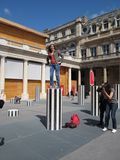 donors. All the Part II students (plus me) hop on the Eurostar at 7.30 (after a unpleasantly early start), get to Paris by 10.45...do a swoop on the Louvre, have a long lunch, back for another session in the Louvre, have a drink in a pavement bar, and catch the 19.13 train back to London (knackered...but great revision, and fun).
donors. All the Part II students (plus me) hop on the Eurostar at 7.30 (after a unpleasantly early start), get to Paris by 10.45...do a swoop on the Louvre, have a long lunch, back for another session in the Louvre, have a drink in a pavement bar, and catch the 19.13 train back to London (knackered...but great revision, and fun).
 The Louvre always springs surprises (not least this year a large hanging poster in the Pyramid of a colossal Tony Grafton, who is obviously about to lecture there -- on the left).
The Louvre always springs surprises (not least this year a large hanging poster in the Pyramid of a colossal Tony Grafton, who is obviously about to lecture there -- on the left).
But rather more to the point, there was temporary exhibition on show, of archaeological discoveries from the river Rhone at Arles.
The star of the show was meant to be the Roman portrait, optimistically identified as Julius Caesar ("Mon dieu, c'est Jules César" as the underwater archaeologist is supposed to have shouted as soon as he had emerged from the river and taken his breathing equipment off...with slight Schliemann-like overtones).
I had seen pictures and films of this piece, and talked about him in my Washington DC lectures, but I had never actually met him in the flesh, so I was particularly keen to visit this exhibition.

The encounter didnt change my mind: this is a really wonderful Roman portrait, but there is hardly any reason at all to identify him as Caesar (and quite a few not to). Interestingly, they had brought the so-called Julius Caesar from Tusculum (now in Turin) as a comparison (on the right). This turns out to be a much less distinguished piece of work (and something nasty has happened to its marble surface) . . . and I honestly don't see why it should be a Julius Caesar either (except that there presumably are some statues of Caesar somewhere).
reason at all to identify him as Caesar (and quite a few not to). Interestingly, they had brought the so-called Julius Caesar from Tusculum (now in Turin) as a comparison (on the right). This turns out to be a much less distinguished piece of work (and something nasty has happened to its marble surface) . . . and I honestly don't see why it should be a Julius Caesar either (except that there presumably are some statues of Caesar somewhere).
But the good news was that there was lots more in the show -- and an extraordinary glimpse of what Roman Arles must have looked like.
 The real star of the show for me was actually a bronze statuette (about one quarter life-size) of a bearded captive, with is hands tied behind his back. Arles was a Roman colony, and presumably this was just one part of a triumphalist monument that shouted about Roman control of this part of the world.
The real star of the show for me was actually a bronze statuette (about one quarter life-size) of a bearded captive, with is hands tied behind his back. Arles was a Roman colony, and presumably this was just one part of a triumphalist monument that shouted about Roman control of this part of the world.
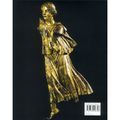 And there was more of the same kind of thing. A lovely little figure of Victory (well lovely if you were on the right side, I guess) and some splendid bronze relief dolphins.
And there was more of the same kind of thing. A lovely little figure of Victory (well lovely if you were on the right side, I guess) and some splendid bronze relief dolphins.
They all rather put the supposed Caesar in the shade.
So a good (and instructive) day was -- as you see -- had by all!
May 11, 2012
Question Time, Oldham and (not) gay marriage
I was on TV's Question Time last night. It had actually been fixed up ages ago, and wasn't simply a a response to my new-found, and no doubt short-lived, celebrity as the TV presenter who is too ugly for TV/doesnt brush her hair etc etc . (This did, of course, rather give an added edge to the pre show make-up session... but luckily the extremely nice make-up lady was completely on message with the idea that I really COULDN'T be made to look as if I had suddenly changed my mind, complete with mascara and lippy.)
I have done Question Time once before, and -- as I think I said then -- it is about the closest thing to doing an exam that I now know. First you have to question spot, then revise like hell. You also need to look at last year's paper (ie last week's programme) as the same questions aren't very likely to come up twice in a row (though as every canny examinee knows, you can never be quite sure of that).
The difference is that the question spotting goes on right up to the very last minute. A controversial speech by some government minister, sounding off about (say) the state of the nation's teeth, can at a stroke make entirely wasted all that work you put into revising police pay and conditions.
But, of course, even without those little surprises, you are bound revise more than comes up. Yesterday I woke up to the Today programme featuring Obama "coming out" for gay marriage. And took a punt that someone would be asking about that.
They didn't. But in this case the wasted revision had its own rewards. After a quick tutorial with my ex-parliamentarian neighbour and legal type (thank you David), and an hour or so on-line, I found that it raised even more intriguing questions than I thought.
The truth is that -- while I have long been quite sure that there should be same-sex marriages if people want them -- I have never quite understood what the practical differences are between a marriage and a civil partnership.
It seems that there really aren't any, except the name (well...the civil partner of a man who is knighted doesn't get a title, whereas a wife would be called 'Lady"; hardly great shakes). Leaving religious debates aside (and, OK, they will be important for some), the issue seems to come down to the sheer fact of nominal difference: that is to say, simply in the name, our current arrangements parade same-sex partnerships as lesser forms of marriage.
So far, so good. But the muddle doesn't stop there. Another issue is that civil partnerships are not available to heterosexual couples even if they want them. Among those of us brought up to believe marriage had to be understood as one of the most exploitative weapons of patriarchy, some might actually prefer something not tainted by the hateful name. (In fact, some of us remain slightly bemused by the current enthusiasm for marriage -- which was an institution only a few decades ago we thought we wanted to destroy.) But we cant have one.
By contrast, as David explained, civil partnership (pacte civile) is currently available to all combinations in France -- though currently marriage only to heterosexuals.
But dig a little deeper, and it gets even murkier -- complicated by the accretion of conflicting custom and legislation back to the 18th century. I remember when I got married myself, we discovered that all those standard formulae about 'till death us do part' are nothing to do with the law itself, but merely customary. In order to be legally married all you have to say is "I do" (vel sim) in public in front of witnesses. In our case, as almost everyone on the room from the groom to the bride's mother was at least once divorced, we wanted "till death us do part" removed from the ceremony . . . a feat we achieved, after considerable effort.
But David pointed me to the most curious thing yet. Have you ever wondered why you haven't been invited to a night-time wedding? Well that's because until the passing of a bill that received royal assent on 1 May 2012, since the early 19th century marriages have only been allowed to take place between the hours of 8.00 am and 6.00 pm. (Goodness knows why... so you could see you were marrying the right guy?)
My conclusion? First, get some bright civil servant to go through all this, root out the anachronisms and get the rules tidied up and simplified. Second, give everyone gay or straight a civil partnership, and make that the gold-standard... and leave "marriage" as the optional extra, the religious ceremony, on whatever terms the religions concerned manage to hammer out (and no business of the state at all).
Anyway you were spared all that last night...!
I should say though we were entertained beautifully at a great school in Oldham -- The Radclyffe School -- in a brand new building (pictured at the top), and with a really impressive head. I managed to meet a few of the pupils. Thanks for being so nice all of you
May 7, 2012
Willetts, research, open access -- and wiki
I find myself in a dliemma about David Willetts's latest pronouncement about free access on-line to publicly finded research -- not unlike my dilemma about podcasts, I guess. There is certainly something in what he says: the public purse funds pricey research which then ends up being published in journals that even the richest of UK universities can barely afford to buy.
What could possibly be right in that? And why on earth throw more money after the likes of Elsevier and the other big publishers? Just to give an example or two: an individual annual subscription to the International Journal of Obesity is £2840, and an institutional subscription to Nature ( a pretty basic scientific journal) for a school or university with under 2999 students is £3682 per annum (and add £666 if you would also like Scientific American).
So far so good.. and we can all think that this can't be good sense. But, if I've got the right end of the stick. the problem with Willetts' s bright idea (as with all well-intentioned, half baked ideas) is that one size doesnt fit all, and what goes for Nature doesnt go across the board.
I, for example, am on the editorial committee of the Journal of Roman Studies, which is produced by the Society for the Promotion of Roman Studies, a 'learned society' established in 1910. For £46 a year a full member gets the JRS, as well as a series of meetings and lectures, plus free access to a Library in London (as well as the possibility of borrowing books by post). That Library is partly subsidizing by the Journal -- and a majot research hub for everyone in the field. Add to that the fact that anyone who submits an article to JRS gets its reviewed (with detailed comments) by at least two senior scholars in the field, who get no payment for their time.
A student subscription for an online copy of the Journal only, but with all other privileges, is just £25 a year.
It looks a bargain, honestly.
How it would work under Willetts's scheme I really dont know. Would we only be able to take articles that had NOT been publicly funded? And how do we recognise those... if I did half of it on AHRC leave, and the other half of it not, how does that count?
And anyway, I am not sure that I follow the idea that everything publicly funded should be free at point of use. I mean we pay for NHS prescriptions and for entry to English Heritage sites... why should it be entirely wrong to get access to the fruits of publicly funded research for a modest fee? (I'm not talking of the £3000 subscription per annum... I'm talking of the low cost JRS, and all the other modest humanities journals, who run for very little money on a lot of good will.)
And what does this say for the future of academic monograph publishing... where likewise there are some terrible rip-offs, and some extraordinary reasonable "value added" inputs.
As for bringing in Jimmy Wales as special guru, words fail me. Sure, I quite often link to wiki artcles on this blog (as I have just done), but that's because I trust you to recognise the unreliable information. But wiki is notoriously error-struck (how else could it be?)... hard to see it as a model for any form of high quality academic dissemination.
May 4, 2012
M I Finley, reviewing, and what to do about student protests
I have spent most of the week (when I havent been dodging the BRICKbats) with Moses Finley. As I said a few posts ago, I am giving a paper at the end of May on Finley's journalism; and the more I go on the more of it there turns out to be.
Quite how he found the time, through the 1960s and 1970s, to write so many book reviews and radio broadcasts (not to mention the colour supplement articles on the temples of Sicily etc), I really cant imagine. There was, it is true, a bit of re-cycling (the comparison of etruscheria to chinoiserie comes up more than once), and he had a number of standard tactics (like the trope of isolating a key theme and then saying "it's not even in the index").
By and large, the reviews are pretty sparkling...and pretty devastating, sometimes unkind, stuff. Finley didn't really admire many of the books he was sent to review. And it is clear from their wounded "letters to the editor" that the victims smarted at such swipes as "There are limits of tolerance and respect for errors and I am sorry to say that this book transcends them" (for "sorry", read "delighted"); or "so much earnest effort to so little purpose".
Amidst the reviews I've also come across quite a few of his little essays on culture, the state of Classics, or university politics. Given the current debates in Cambridge about the punishment meted out to Owen Holland for disrupting David Willetts's speech here earlier in the year, one particular article caught my eye.
It was a comment article in the Cambridge Review for 19 April 1968, entitled (groan) "Dr Finley's Casebook". It obviously followed some kind of student protest and subsequent punishment.. in which someone had been "sent down".
This is what Finley had to say: "Expulsion from a university is a life sentence wildly out of proportion to a pot of red pain, a pocketful of pepper or even shouting down one of Her Majesty's ministers".
Spot on really. Can hardly be bettered for good sense, some of which we could do with now.
(On another, related topic, I am trying to get hold of any audio recordings of Finley's Third Programme (later Radio Three) talks in the 1960s and 70s. These aren't preserved in the BBC Sound Archive. If anyone knows of any recordings lurking anywhere, do let me know -- bootleg or not.)
April 30, 2012
Mr "Hot Sex": the full story
One of the real stars of "Meet the Romans" has been the innkeeper Lucius Calidius Eroticus ("Mr Hot Sex") along with his wife, Fannia Voluptas ("Madame Gorgeous"). We took a quick look at their tombstone.. and wondered about what the names (trade names, pretty obviously) said about ancient pub culture.
We didn't have time to look at the rest of the stone, which has more to tell of story. You can see the whole thing at the top. At the bottom, there is a little sculptured scene of a man with a mule (or whatever... small equid). He's dressed in a travellers cloak with a hood, and he's handing over cash to a man on the left, who's presumably Eroticus.
And between the names at the top and the picture at the bottom, there is a little dialogue of 'life in the bar'. A customer (the guy in the cloak) is settling his bill. It goes like this . . .
Customer: "Innkeeper. Let's work out the bill"
Innkeeper: "You've got a sextarius of wine there, that's one as . Bread, one as. And the dips, two asses."
Customer: "That's right"
Innkeeper: "You had a girl. That's eight asses"
Customer: "That's right too."
Innkeeper: "And hay for the mule. Two asses."
Customer: "That mule will be the ruin of me"
It's another nice glimpse of the jokey culture of the Roman bar.
This is how the Latin goes:
L. Calidius Eroticus sibi et Fanniae Voluptati vivus fecit.
‘copo, computemus.’
‘habes vini sextarium unum, panem asse uno, pulmentarium assibus duobus.’
‘convenit.’
‘puellam, assibus octo.’
‘et hoc convenit.’
‘faenum mulo, assibus duobus.’
‘iste mulus me ad factum dabit.
One tricky word is "pulmentarium". I translated it "dips". Not quite right: it means "what goes with bread". The dictionary says "relishes"... my American friend says "sides".
The original is from Aesernia (in South Italy), but now in the Louvre. Its epigraphic reference is CIL IX, 2689.
Mary Beard's Blog
- Mary Beard's profile
- 4112 followers




